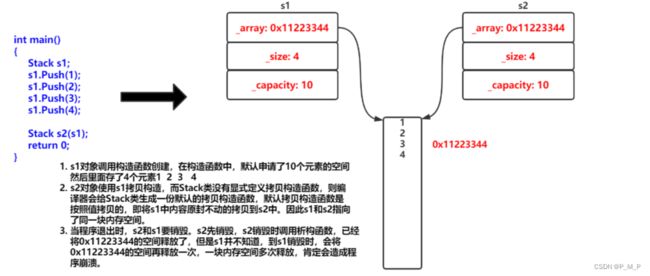【C++】拷贝构造函数和赋值运算符重载详解
目录
拷贝构造函数
概念
特征
赋值运算符重载
运算符重载
赋值运算符重载
编辑前置++和后置++重载
⭐拷贝构造函数
⭐概念
拷贝构造函数:只有单个形参,该形参是对本类类型对象的引用(一般常用const修饰),在用已存
在的类类型对象创建新对象时由编译器自动调用。
拷贝构造函数是一个特殊的构造函数,用于创建一个新的对象,其内容与另一个已存在的对象相同。在C++中,拷贝构造函数通常用于将一个对象的值复制到另一个对象中(一个对象存在,一个对象不存在),以便在程序中进行对象的赋值和传递操作时,能够确保对象的内容被正确复制。
⭐特征
拷贝构造函数也是特殊的成员函数,其特征如下:
- 拷贝构造函数是构造函数的一个重载形式。(函数名也与类名相同,第一个参数是隐式的this,第二个参数是被拷贝的对象,如果我们自己实现了拷贝构造函数,也要自己实现一个构造函数,否则会报错,如图:)

- 拷贝构造函数的参数只有一个且必须是类类型对象的引用,如果使用传值方式编译器直接报错,因为会引发无穷递归调用。(C++规定自定义类型传值传参时都会调用它的拷贝构造,因为传值传参时,形参相当于一份拷贝,如果拷贝构造函数也是用传值的形式写的,那么它会继续寻找真正的拷贝构造函数,造成无穷递归)
 传值的后果:
传值的后果:

- 若未显式定义,编译器会生成默认的拷贝构造函数。 默认的拷贝构造函数对内置类型成员按内存存储按字节序完成拷贝,自定义类型成员调用它的拷贝构造函数(事实上最后还是对内置类型做处理),这种拷贝叫做浅拷贝,或者值拷贝。
class Time { public: Time() { _hour = 1; _minute = 1; _second = 1; } Time(const Time& t) { _hour = t._hour; _minute = t._minute; _second = t._second; cout << "Time::Time(const Time&)" << endl; } private: int _hour; int _minute; int _second; }; class Date { public: void Print() { cout << _year << "-" << _month << "-" << _day << endl; } private: // 基本类型(内置类型) int _year = 1970; int _month = 1; int _day = 1; // 自定义类型 Time _t; }; int main() { Date d1; d1.Print(); // 用已经存在的d1拷贝构造d2,此处会调用Date类的拷贝构造函数 // 但Date类并没有显式定义拷贝构造函数,则编译器会给Date类生成一个默认的拷贝构造函数 Date d2(d1); d2.Print(); return 0; } -
编译器生成的默认拷贝构造函数已经可以完成字节序的值拷贝了,还需要自己显式实现吗?
当然像日期类这样的类是没必要的。那么下面的类呢?验证一下试试?// 这里会发现下面的程序会崩溃掉?这里就需要深拷贝去解决。 typedef int DataType; class Stack { public: Stack(size_t capacity = 10) { _array = (DataType*)malloc(capacity * sizeof(DataType)); if (nullptr == _array) { perror("malloc申请空间失败"); return; } _size = 0; _capacity = capacity; } void Push(const DataType& data) { // CheckCapacity(); _array[_size] = data; _size++; } ~Stack() { if (_array) { free(_array); _array = nullptr; _capacity = 0; _size = 0; } } private: DataType* _array; size_t _size; size_t _capacity; }; int main() { Stack s1; s1.Push(1); s1.Push(2); s1.Push(3); s1.Push(4); Stack s2(s1); return 0; } 注意:类中如果没有涉及资源申请时,拷贝构造函数是否写都可以;一旦涉及到资源申请
注意:类中如果没有涉及资源申请时,拷贝构造函数是否写都可以;一旦涉及到资源申请
时,则拷贝构造函数是一定要写的,否则就是浅拷贝 -
拷贝构造函数典型调用场景:
· 使用已存在对象创建新对象
· 函数参数类型为类类型对象
· 函数返回值类型为类类型对象
class Date { public: Date(int year, int month, int day) { cout << "Date(int,int,int):" << this << endl; } Date(const Date& d) { cout << "Date(const Date& d):" << this << endl; } ~Date() { cout << "~Date():" << this << endl; } private: int _year; int _month; int _day; }; Date Test(Date d) { Date temp(d); return temp; } int main() { Date d1(2022, 1, 13); Test(d1); return 0; }
⭐赋值运算符重载
⭐运算符重载
C++为了增强代码的可读性引入了运算符重载,运算符重载是具有特殊函数名的函数,也具有其
返回值类型,函数名字以及参数列表,其返回值类型与参数列表与普通的函数类似。
函数名字为:关键字operator后面接需要重载的运算符符号(operator+())。
函数原型:返回值类型 operator操作符(参数列表)
注意:
- 不能通过连接其他符号来创建新的操作符(必须是C/C++语法中存在的操作符):比如operator@
- 重载操作符必须有一个类类型参数(有一个参数是作为this指针隐式传递的,不需要写出来)
- 用于内置类型的运算符,其含义不能改变,例如:内置的整型+,不能改变其含义
- 作为类成员函数重载时,其形参看起来比操作数数目少1,因为成员函数的第一个参数为隐藏的this
- .* :: sizeof ?: . 注意以上5个运算符不能重载。
下面实现一个全局的operator==
class Date
{
public:
Date(int year = 1900, int month = 1, int day = 1)
{
_year = year;
_month = month;
_day = day;
}
//private:
int _year;
int _month;
int _day;
};
bool operator==(const Date& d1, const Date& d2)
{
return d1._year == d2._year
&& d1._month == d2._month
&& d1._day == d2._day;
}
void Test()
{
Date d1(2018, 9, 26);
Date d2(2018, 9, 27);
cout << (d1 == d2) << endl;
}这里会发现运算符重载成全局的就需要成员变量是公有的,那么问题来了,封装性如何保证?
这里其实可以用友元解决,或者干脆重载成成员函数。
下面写一个运算符重载成成员函数的写法:
class Date
{
public:
Date(int year = 1900, int month = 1, int day = 1)
{
_year = year;
_month = month;
_day = day;
}
// bool operator==(Date* this, const Date& d2)
// 这里需要注意的是,左操作数是this,指向调用函数的对象
bool operator==(const Date & d2)
{
return _year == d2._year;
&& _month == d2._month
&& _day == d2._day;
}
private:
int _year;
int _month;
int _day;
};⭐赋值运算符重载
赋值运算符重载格式:
- 参数类型:const T&,传递引用可以提高传参效率
- 返回值类型:T&,返回引用可以提高返回的效率,有返回值目的是为了支持连续赋值(例如,(i=j)=10,最后i=10,如果返回的不是引用,则不能实现这个效果)
- 检测是否自己给自己赋值
- 返回 *this :要符合连续赋值的含义
class Date
{
public:
Date(int year = 1900, int month = 1, int day = 1)
{
_year = year;
_month = month;
_day = day;
}
Date(const Date& d)
{
_year = d._year;
_month = d._month;
_day = d._day;
}
Date& operator=(const Date& d)
{
if (this != &d)//防止对自己赋值,提高效率
{
_year = d._year;
_month = d._month;
_day = d._day;
}
//这里有返回值才能符合连续赋值
//如果返回的不是引用,则还会调用拷贝构造创建一个对象,返回的是一个新的对象副本。
//如果返回的是引用,则不会调用拷贝构造
return *this;
}
private:
int _year;
int _month;
int _day;
};
int main()
{
Date d1(2024, 2, 3);
Date d2(2024, 2, 10);
Date d3(2024, 10, 3);
d3 = d2 = d1;
}赋值运算符只能重载成类的成员函数不能重载成全局函数
class Date
{
public:
Date(int year = 1900, int month = 1, int day = 1)
{
_year = year;
_month = month;
_day = day;
}
int _year;
int _month;
int _day;
};
// 赋值运算符重载成全局函数,注意重载成全局函数时没有this指针了,需要给两个参数
Date& operator=(Date& left, const Date& right)
{
if (&left != &right)
{
left._year = right._year;
left._month = right._month;
left._day = right._day;
}
return left;
}
// 编译失败:
// error C2801: “operator =”必须是非静态成员原因:
赋值运算符如果不显式实现,编译器会生成一个默认的。此时用户再在类外自己实现一个全局的赋值运算符重载,就和编译器在类中生成的默认赋值运算符重载冲突了,故赋值运算符重载只能是类的成员函数。

用户没有显式实现时,编译器会生成一个默认赋值运算符重载,以值的方式逐字节拷贝。
注意:内置类型成员变量是直接赋值的,而自定义类型成员变量需要调用对应类的赋值运算符
重载完成赋值。
class Time
{
public:
Time()
{
_hour = 1;
_minute = 1;
_second = 1;
}
Time& operator=(const Time& t)
{
if (this != &t)
{
_hour = t._hour;
_minute = t._minute;
_second = t._second;
}
return *this;
}
private:
int _hour;
int _minute;
int _second;
};
class Date
{
private:
// 基本类型(内置类型)
int _year = 1970;
int _month = 1;
int _day = 1;
// 自定义类型
Time _t;
};
int main()
{
Date d1;
Date d2;
d1 = d2;
return 0;
}既然编译器生成的默认赋值运算符重载函数已经可以完成字节序的值拷贝了,还需要自己实
现吗?当然像日期类这样的类是没必要的。那么下面的类呢?验证一下试试?
// 这里会发现下面的程序会崩溃掉?这里就需要深拷贝去解决。
typedef int DataType;
class Stack
{
public:
Stack(size_t capacity = 10)
{
_array = (DataType*)malloc(capacity * sizeof(DataType));
if (nullptr == _array)
{
perror("malloc申请空间失败");
return;
}
_size = 0;
_capacity = capacity;
}
void Push(const DataType& data)
{
// CheckCapacity();
_array[_size] = data;
_size++;
}
~Stack()
{
if (_array)
{
free(_array);
_array = nullptr;
_capacity = 0;
_size = 0;
}
}
private:
DataType* _array;
size_t _size;
size_t _capacity;
};
int main()
{
Stack s1;
s1.Push(1);
s1.Push(2);
s1.Push(3);
s1.Push(4);
Stack s2(s1);
return 0;
}注意:如果类中未涉及到资源管理,赋值运算符是否实现都可以;一旦涉及到资源管理则必
须要实现。

⭐前置++和后置++重载
在C++中,前置++和后置++运算符可以被重载为类的成员函数或全局函数。重载前置++运算符时,需要返回引用以允许连续的递增操作。而重载后置++运算符时,需要返回一个临时对象,以保持原始值的副本,而为了区分两个函数,后置++的重载函数会有一个int类型的形参,实际上可以不用传递,编译器会自动识别。
class Date
{
public:
Date(int year = 1900, int month = 1, int day = 1)
{
_year = year;
_month = month;
_day = day;
}
// 前置++:返回+1之后的结果
// 注意:this指向的对象函数结束后不会销毁,故以引用方式返回提高效率
Date& operator++()
{
_day += 1;
return *this;
}
// 后置++:
// 前置++和后置++都是一元运算符,为了让前置++与后置++形成能正确重载
// C++规定:后置++重载时多增加一个int类型的参数,但调用函数时该参数不用传递,编译器
//自动传递
// 注意:后置++是先使用后+1,因此需要返回+1之前的旧值,故需在实现时需要先将this保存一份,然后给this + 1
// 而temp是临时对象,因此只能以值的方式返回,不能返回引用
Date operator++(int)
{
Date temp(*this);
_day += 1;
return temp;
}
private:
int _year;
int _month;
int _day;
};
int main()
{
Date d;
Date d1(2022, 1, 13);
d = d1++; // d: 2022,1,13 d1:2022,1,14
d = ++d1; // d: 2022,1,15 d1:2022,1,15
return 0;
}前置++:
返回+1之后的结果
注意:this指向的对象函数结束后不会销毁,故以引用方式返回提高效率
后置++:
前置++和后置++都是一元运算符,为了让前置++与后置++形成能正确重载,C++规定:后置++重载时多增加一个int类型的参数,但调用函数时该参数不用传递,编译器自动传递
注意:后置++是先使用后+1,因此需要返回+1之前的旧值,故需在实现时需要先将this保存一份,然后给this + 1,而temp是临时对象,因此只能以值的方式返回,不能返回引用
___________________________________________________________________________________
⭐感谢你的阅读,希望本文能够对你有所帮助。如果你喜欢我的内容,记得点赞关注收藏我的博客,我会继续分享更多的内容。⭐



